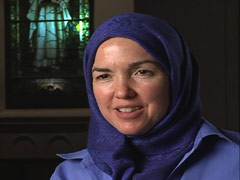In This Episode << SLIDE LEFT TO SEE ADDITIONAL SEGMENTS
Explaining Islam
BOB ABERNETHY, anchor: Now, a group of Catholic monastics who invited a prominent Muslim to tell them about her religion. At St. John’s University and Abbey in Collegeville, Minnesota, Benedictine monks and nuns gathered to hear what people of other faiths believe and how their practices might help the Benedictines. Dean of the School of Theology at St. John’s is William Cahoy.
Dean WILLIAM CAHOY (St. John’s University and Abbey, Collegeville, Minnesota): The challenge of what we are trying to do here is to understand how to receive people of other religions as if they were Christ, extend to them this hospitality, be humble and listen to what they have to say.

Dr. Ingrid Mattson |
ABERNETHY: The speaker last summer was Ingrid Mattson, professor of Islamic studies at Hartford Seminary in Connecticut and the president of the Islamic Society of North America.
Dr. INGRID MATTSON, (Professor, Islamic Studies, Hartford Seminary and President, Islamic Society of North America, speaking before group): In the name of God the merciful, the compassionate.
ABERNETHY: Mattson spoke of one Muslim belief many Catholics would find familiar.
Dr. MATTSON: It’s really more than anything a message of awareness—that what we need to be as human beings is to be aware of simply all of the signs that are everywhere and available to us of God’s loving presence and power over all things. That is the essential message of Islam.
The verses in the Qu’ran are all called “signs.” But what’s interesting is that the verses in the Qu’ran are always pointing to external signs: look at how God created the Earth; look at how the trees and the plants bow down to God. There’s this beautiful relationship between the Qu’ran in the revealed text and the signs that God has created outside.
Islam does not believe in original sin. Islamic doctrine according to the Qu’ran is that human beings are born pure, but they’re not born outside of history.
ABERNETHY: The world, said Mattson, can demean and wound people, so the Muslim community must be charitable and make repairs.
Dr. MATTSON: This is a strong message of the Qu’ran—that we are responsible as individuals to make the greatest effort, but we are responsible collectively as communities, as humanity, to create the environment in which every human being can develop their resources as best as possible.
ABERNETHY: Muslims do not accept such Christian doctrines as the Trinity. They consider Jesus a great prophet but not the son of God, and they believe the Bible has been superseded by the Qu’ran. Nevertheless, for Mattson—
Dr. MATTSON: Christians and Muslims have far more in common in terms of the fundamentals than we have differences. Belief in God—the simple belief in God in a world in which that belief is falling away is such a strong common ground theologically.

